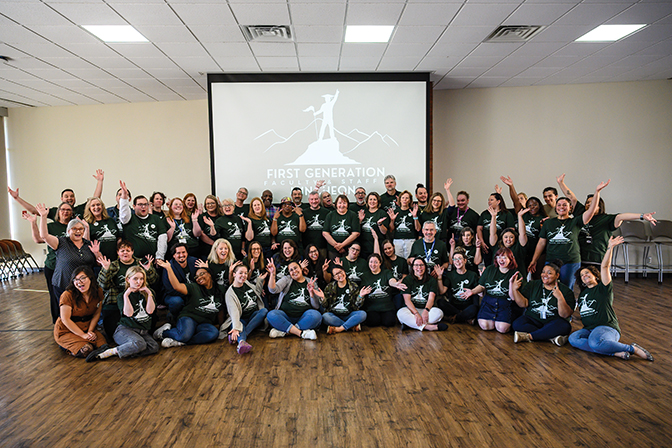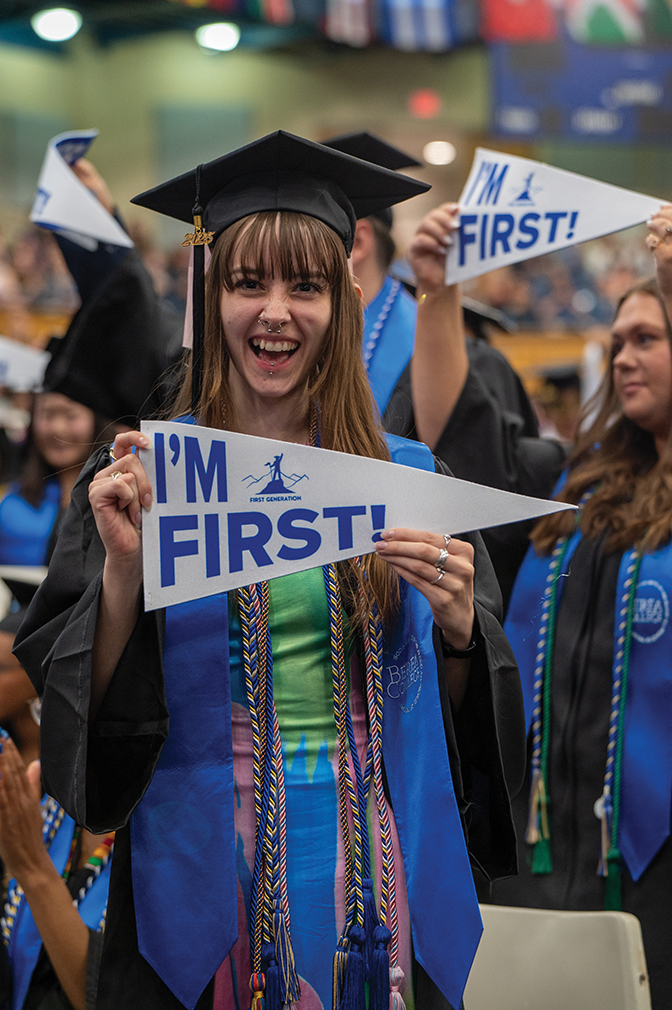Although my parents were both schoolteachers, when I began my undergraduate journey, I encountered aspects of a world very different from high school. I could, though, rely on my parents to tell me what a “registrar” was or what a “bursar” did whenever higher education language was befuddling. I also attended a university where many students came from the highest quintile of family income, which was another aspect of college with which I had to come to terms. Even though I wasn’t a first-generation college student (my father was), the world of college was often new and sometimes unsettling.

Berea College enrolls many students who are the first in their families to complete a four-year degree. The percentage of first-generation students is a metric point we follow closely because it reflects our mission. And we take serving first-gen students very seriously. I recall a story when our ninth president arrived and encountered an employee on the quad. The president asked this Berean what his job was. Although he then worked in facilities management, his response was, “I think my job is pretty much like other employees here: to ensure that students get across the commencement platform successfully.” What a great response.
All college students have both assets and challenges. College students from high-wealth families, though, have many advantages. In the 18 years prior to entering higher ed, wealthy students have had the benefit of family income to help them transcend a challenge. I think, for example, of a young swimmer who has difficulty with lane turns, so parents hire a swim coach to help the swimmer get the hang of that complex maneuver. By summer’s end, the swimmer has shaved seconds off a time and gained a dose of confidence in the water and beyond.
Social science has examined how scarcity impacts families with low household incomes, discovering that so much “bandwidth” is dedicated to financial matters that it can lead to worse outcomes in other areas. For such students, Berea College is a unique opportunity in higher education. Not charging tuition since 1892, the College covers all expenses for students, beyond what the FAFSA® form indicates must be paid by the student, without packaging loans. Such support helps students dedicate significantly more of their “bandwidth” to academic pursuits instead of financial. It is why U.S. News and World Report describes Berea students as graduating with the lowest educational debt in the nation.
For four short and often intense years, Berea can invest in each student in ways wealthy families do for their children. Berea’s investment comes in human as well as in material examples. Within hours of arriving on campus, a new student meets a caring and committed faculty advisor who will guide that student through the first year. That new student will receive on the same day a brand-new laptop to remove the technology barrier, and in 48 hours, the student will meet a caring mentor in a labor supervisor who can complement academic and work learning.

That student can get free dental care, free counseling or even free professional clothing for a summer internship that is also funded by the College. The student can study abroad at minimal cost and receive preparation funding for post-graduate education tests, like the GRE, MCAT or GMAT. And at graduation, a student can get a minimum of $500 to relocate to another place for a job or graduate school, or to afford a security deposit on an apartment. Most of these supports are made possible by alumni and friends who believe deeply in Berea’s mission to change a student’s trajectory forever.
Three key ingredients are found in Berea’s success recipe with students: a place that welcomes all peoples of the earth, a place that provides unparalleled support for each student to succeed, and a counterintuitive ingredient based on the homogeneity of socioeconomic background. No Berea student arrives on a Greyhound bus only to meet a roommate flown in on the family’s private jet. No one at Berea has less or more than another. It is why Berea is No. 1 in economic access to higher education, according to a 2023 New York Times ranking.
The outcome of such support, particularly for students whose families are unfamiliar with higher education, is striking. Except for dependents of Berea employees and a handful of exchange students, all students must prove they are eligible for a Pell grant or would be if they were U.S. citizens.
Berea’s work then ensures that the federal government’s support through Pell grants and the Work College appropriation are good investments in trajectory change—Berea graduates Pell students at twice the national average.
While Berea serves students from all 50 states, 65 percent of our students are from Kentucky and Appalachia, and three-quarters of Berea’s graduates remain in Kentucky and Appalachia, ensuring its high-talent graduates will provide necessary leadership in the region.
Berea College is the very model of higher education many in this country want. We accept only those of high promise, focusing on those least able to afford college—and we graduate them with the least debt in the country at double the national average for Pell recipients. As the oldest Work College, our students work all four years—so they graduate with relevant work experience and skills that prepare them for a career beyond Berea. Finally, for more than 130 years, we have served a region that needs skilled workers in healthcare, technology, education, agriculture, business and more.
Recalling the Berea employee who said his job was to ensure every student gets across the commencement platform, each commencement is a moving and inspiring day, and especially so when graduates who are the first in their families to earn a four-year college degree are asked to stand for everyone to see and applaud. One cannot help but tear up looking at the many students who proudly rise. This past May was even more powerful when first-gen students held up a pennant that proclaimed, “I’M FIRST!”
They are indeed, and the world awaits their hard work and commitment. Alumni and friends can be grateful for the role they have played with on-campus Bereans to get graduates like these to such a great finish line, ready to begin their next journey.
On Nov. 8, 2023, Berea celebrated its first national First-Gen Day by honoring first-generation staff and faculty. Matching t-shirts showed students how many in their support network once shared their journey. The date marks the anniversary of the 1965 Higher Education Act.


Amazing, is there space there for African student.
Habakkuk, yes, we accept applications for students from Africa. Please visit our Admissions page for international students for more information: https://www.berea.edu/admissions/admission-information/apply/checklist-items/international-faqs